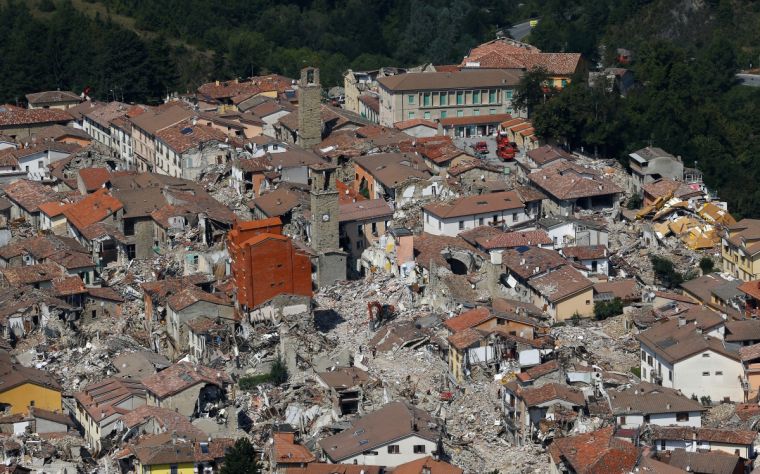Is An Earthquake Really A Sign Of God's Wrath?

The Catholic priest who blamed Italy's recent earthquakes on gay marriage has doubled down on his assertions in a radio interview.
Fr Giovanni Cavalcoli said at the weekend that "human sins, such as civil unions" were behind the earthquakes that have killed hundreds, made thousands homeless and destroyed historic churches and monuments that were hundreds of years old.
The Vatican distanced itself from his comments, saying the idea God sought revenge through inflicting natural disasters was a "pagan vision" dating from "the pre-Christian era". Archbishop Angelo Becciu said Cavalcoli's comments were "offensive to believers and disgraceful for non-believers".
But Cavalcoli has competition. According to Israel's Deputy Foreign Minister Ayoub Kara, the quakes were divine punishment for Italy's abstention on a UNESCO resolution about the status of Jerusalem's holy sites.
And this does neatly highlight one of the problems with the whole God-punishes-humans-with-earthquakes view. It is a very blunt instrument. How are we to know exactly the sins God has taken exception to? Is it UNESCO or gay marriage? Or is it a different sin altogether, which no one has noticed?
A bigger problem, however, is not the competition for the causative sins, but the the things God apparently overlooks. John Hagee thought gay marriage was behind Hurricane Katrina; Pat Robertson thought Ariel Sharon's stroke was because he evacuated illegal settlements from Gaza. Former congresswoman Michele Bachmann also prophesied national disasters because of President Obama's foreign policy regarding Israel.
But what about the things human beings get away with? Why didn't God judge America when it was lynching black people with impunity instead of waiting until there was gay marriage? It all seems a bit random.
And that's the problem: there is no credible connectionion between bad things happening in the natural world – like an earthquake – and bad things being done in the human world. The connections people make are invented. At its best, this is because when something terrible happens we look desperately for a reason, an explanation that assures us that somehow God is in control. At its worst, it's because people use natural disasters to promote their own political and theological agenda. The one is excusable; the other isn't.
Does God inflict natural disasters on human beings? The best example in the Bible is the story of Noah, when most of the whole human race is judged with a great flood. But that is a very long way from using that story to back up our own pet causes and suggesting God is sending earthquakes to show His disapproval of same-sex marriage. The later biblical testimony is that God cares about each individual.
In Luke 13:1-5, Jesus tells his followers about two tragedies, one a massacre of Galileans by Pilate, another the collapse of a tower which killed 18 people. His point is that they weren't singled out because they were worse than anyone else: they died because they were mortal. And, he says, "Unless you repent, you too will all perish": everyone is under judgment and everyone is vulnerable, so everyone should turn to God in repentance and faith.
If these natural disasters tell us anything beyond the obvious – build your houses earthquake-proof, invest in tsunami early warning systems, keep your flood defences in good repair – it's that life is terribly fragile and we can't assume that tomorrow is going to be like today. Each of us needs to live prepared to face God at any time, ready to give an account of how we are using the time we have been given.
Follow Mark Woods on Twitter: @RevMarkWoods











